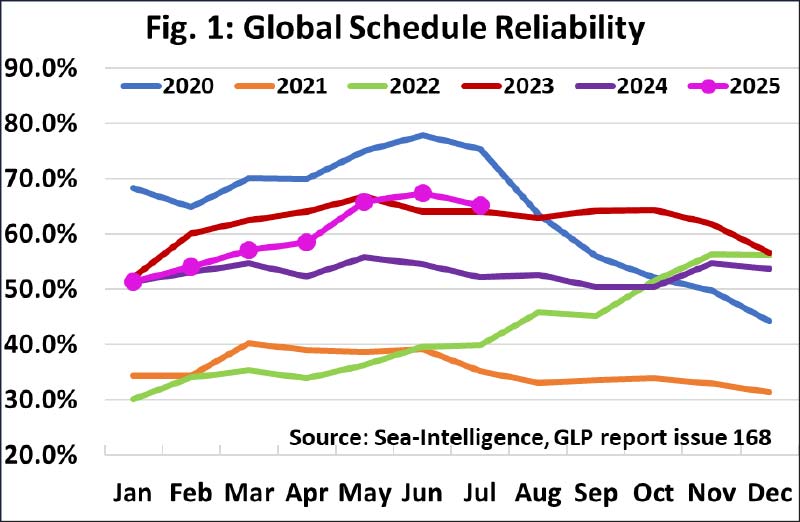Tuesday Jan 20, 2026
Tuesday Jan 20, 2026
Monday, 1 September 2025 03:54 - - {{hitsCtrl.values.hits}}

Global schedule reliability fell in July for the first time since January, Sea-Intelligence reports.
Sea-Intelligence has released Issue 168 of its Global Liner Performance (GLP) report, offering comprehensive insights into global schedule reliability up to and including July 2025.
The 120-page report covers over 60 carriers across 34 trade lanes; this summary highlights key findings from the full analysis.
In July 2025, global schedule reliability dropped 2.2 points MoM to 65.2% — its first decline since January.
However, reliability remains significantly improved on a year-on-year (YoY) basis, up 13 percentage points compared to July 2024.
The average delay for late vessel arrivals also increased slightly, rising by 0.14 days to 4.68 days.
Among the top 13 carriers, Maersk led with a schedule reliability of 80.6%, followed by Hapag-Lloyd at 74.0%.
Six carriers reported reliability in the 60-70% range, while the rest fell between 50-60%. Hyundai Merchant Marine (HMM) recorded the lowest reliability in July at 50.7%.
The report also highlights alliance performance based on two metrics: “All arrivals” (including origin region calls) and “Trade arrivals” (focusing on destination regions).
This dual measure was introduced in February 2025 to account for changes in alliance structures and will converge as the new alliances are fully implemented.
In June-July 2025, the Gemini Cooperation posted the highest reliability, recording 92.0% for all arrivals and 89.6% for trade arrivals.
Mediterranean Shipping Company (MSC) followed with 76.5% and 76.2%, respectively. The Premier Alliance lagged behind, scoring 54.6% for all arrivals and 54.8% for trade arrivals.
Among the legacy alliances, the Ocean Alliance achieved a reliability rate of 69.4%.
In June, global schedule reliability rose 1.6 percentage points MoM to 67.4% — the highest level since November 2023.